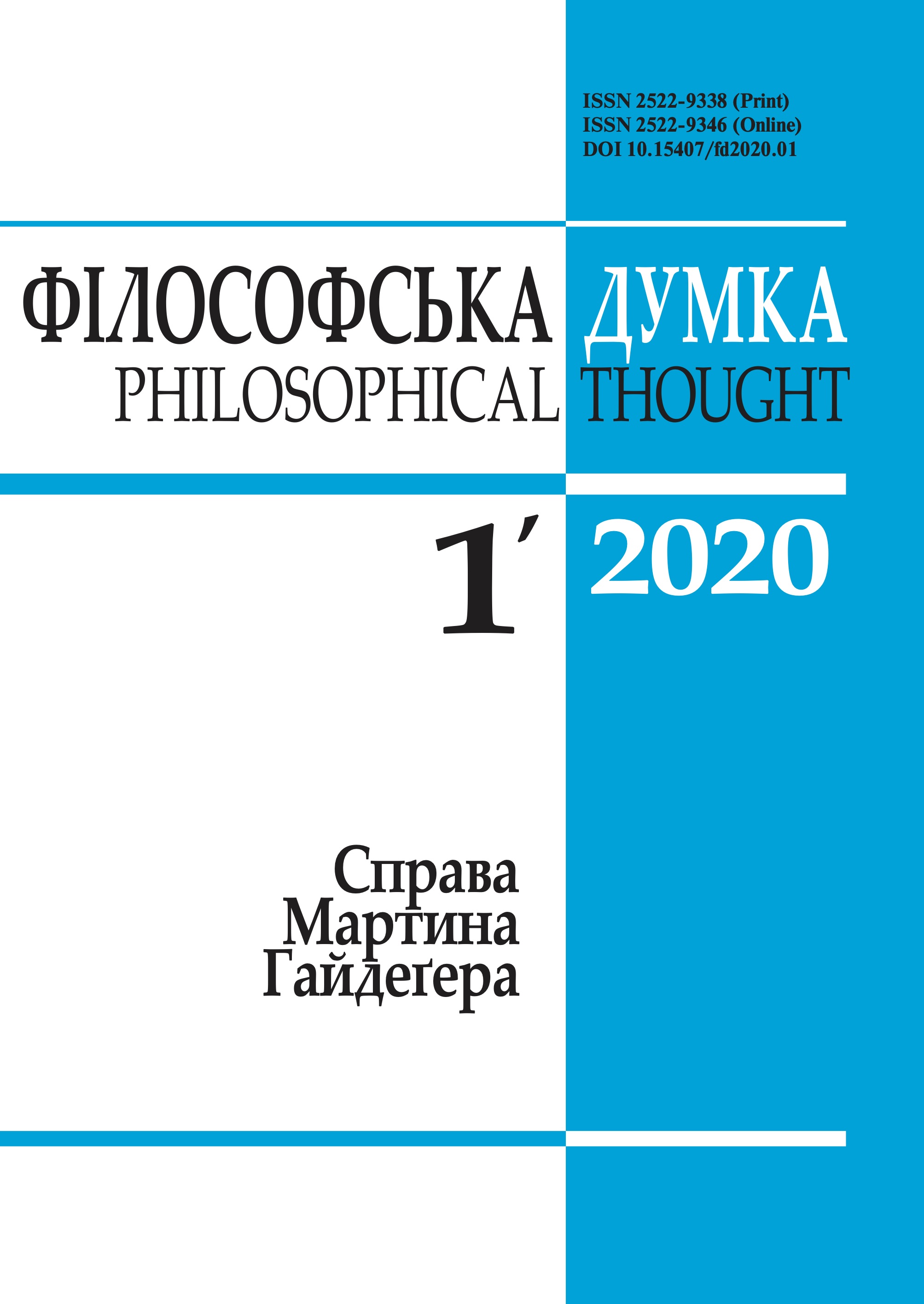Oleksandr Komarov. “Language is the house of being”. What does Heidegger's saying mean?
DOI:
https://doi.org/10.15407/fd2020.01.052Keywords:
language, being, knowledge, name, form, idea of good, speech, thinking, statement, exis- tential structure, truth, ideaAbstract
The purpose of the article is to demonstrate how Heidegger's statement, "Language is the House of Being," claims to represent the essence of all Western European philosophy, namely, as an outline of the unity of indirect identities - being, form and name. The author raises a number of questions in his research. Can we identify "beginning" and "consequence" by exploring the phenomenon of language? Is there anything in the language between beginning and effect? What is a language? And why does Heidegger call language home? Is it possible to identify philosophically what makes language possible regardless of cultural contexts and historical eras? Does the question "What is language?" at the same time lead us to the question "What is a person?" and then "What does it mean to be?"
The article focuses on the connection of Heidegger's philosophy with Plato's philosophy, and therefore on the constancy of fundamental philosophical problems, which finds different ways of expression (mythological, metaphysical, phenomenological...).
The second part of the article is devoted to the actual analysis of the concept of "house of being" through the comprehension of the speech (communicative) dimension of one's being. The author also explores the concept of Heidegger's philosophy of openness, distance, speech: existence is Dasein's relation to being, that is, to one's own making; speech (Rede) as a mode of openness (Dasein) is an existential phenomenon; language (Sprache) is an implementation of self-projecting (entwerfen) speech (Rede) into the "world". Given that a language contains a plurality of certain elements and relationships, the essential unity of the language should be sought at the discontinuity. The gap means openness and freedom of speech. That is, the existential condition of the possibility of language, called in the early Heidegger openness, in his later work appears as a gap, but here and there it is the essential language, which is at the same time the essence of man.
References
Plato (s.a.(a)). Cratylus. Retrideved from: https://books.google.com.ua/books?id=ceOQKf0Zv FMC&printsec=frontcover&dq=Plato.+Cratylus&hl=ru&sa=X&ved=0ahUKEwi41q7j wsXnAhUBxYsKHWzBArYQ6AEIKTAA#v=onepage&q=Plato.%20Cratylus&f=false
Plato (s.a.(b)). The Republic. Retrieved from: https://books.google.com.ua/books?id=aPwPj VIxbGQC&printsec=frontcover&dq=Plato.+the+Republic&hl=ru&sa=X&ved=0ahU KEwihtKmMwsXnAhUMtosKHf-DBAoQ6AEIKTAA#v=onepage&q=Plato.%20 the%20Republic&f=false
Hegel, G.F.W. (1990). Wissenschaft der Logik: Die Lehre vom Sein. Hamburg: Felix Meiner Verlag.
Hegel, G.F.W. (2006). Ph nomenologie des Geistes. Hamburg: Felix Meiner Verlag.
Heidegger, M. (1954). Platons Lehre von der Wahrheit. Bern: Franke AG.
Heidegger M. (1963). Sein und Zeit. T bingen: Max Neimeyer Verlag.
Heidegger, M. (1967). Der europ ische Nihilismus. Stuttgart: Union Druckerei GmbH.
Heidegger, M. (1973). Vom Wesen des Grundes. Frankfurt a.M.: Vittorio Klostermann.
Heidegger, M. (1985). Der Wille zur Macht als Kunst. Frankfurt a.M.: Vittorio Klostermann.
Heidegger, M. (1985). Unterwegs zur Sprache. Frankfurt a.M.: Vittorio Klostermann.
Heidegger, M. (2000 [1954]). Briefuber den Humanismus. Frankfurt a.M.: Vittorio Kloster-mann.
Husserl, E. (1913). Ideen zu einer reinen Ph nomenologie und ph nomenologischen Philosophie. Halle: Verlag von Max Niemeyer.
Jaspers, K. (1971). Psychologie der Weltanschauungen. K ln: Springer-Verlag. Kant, I. (1998). Kritik der reinen Vernunft. Hamburg: Felix Meiner Verlag.
Downloads
-
PDF (Українська)
Downloads: 566
Published
How to Cite
Issue
Section
License
Authors who publish with this journal agree to the following terms:
- Authors retain copyright and grant the journal right of first publication.
- Authors are able to enter into separate, additional contractual arrangements for the non-exclusive distribution of the journal's published version of the work (e.g., post it to an institutional repository or publish it in a book), with an acknowledgement of its initial publication in this journal.
- Authors are permitted and encouraged to post their work online (e.g., in institutional repositories or on their website) prior to and during the submission process, as it can lead to productive exchanges, as well as earlier and greater citation of published work (See The Effect of Open Access).


